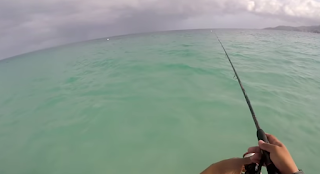 |
| Valencia Eco Resort, Trinidad with bamboo rod |
 |
| Patience at its best at Gran Anse, Grenada with Shakespare rod |
These are undoubtedly my most favourite gears; patience (even though you catch something small or nothing at all), planning, perseverance with like-minded comrades on the trip. However, down to specific pieces of equipment, my most favourite pieces of equipment for:
Freshwater and Sea Fishing
- Bamboo rods are linked back to the centuries old tradition and art of fly fishing. Bamboo is easily available in Trinidad and are ideal for anglers who enjoy the slow and flexible action of the rods. Bamboo rods have a unique feel and experience when trying to catch a fish. However, the disadvantage of bamboo rods are that they are not able to cast far distances and can only be used in small areas near banks.
- A female Adams Fly size 12 in place of earthworms
The female Adams Fly imitates an adult Mayfly, that is,it imitates a lot of small flies and if you skitter it across the water it increases your chance of catching the fish's attention and can earn you a catch. The female Adams Fly is one of the most popular fly around the world because of its ability to almost always catch fishes.
- Kennebec Boundary Pack (fishing vest and tackle box in one)
This vest is water resistant, has vacuum-molded compartments to protect essetials, has four pockets to fit fly boxes or tackles, reels and gear. Has an easy zip-up. The chest and shoulder are made with soft mesh and the suspension system distributes weight evenly, it has plenty loops to attach more gears and has dual zingers to keep the tools handy.
- Shakespeare Ugly Stik rod and Crusader spinning reel
Shakespeare ugly stik rods are the clear choice for anglers who desire lighter rods for various inshore applications. The Ugly sticks are featured to have higher graphite content making them lighter and more sensitive than older models.
- Under Armour Igniting Sunglasses
They are made from a lightweight frame consisting of titanium and grilamid. It also has Armour Sight implemented into the lens where the outer edges aren't darkened which gives 20% better visual and the lenses are more durable. The lens are coated to prevent scratches and smudges which keeps the lens optimized. Additionally, it has an adjustable nose pad and has 100% protection from UVA, UVB and UBC .
Hunting
- Super Bright 8000 Lumens Led Headlamp
It has 5 LED bulbs which can make you see up to 1,40 feet. The headlamp is lightweight and can be switched into four different light modes. It has a lithium battery and can last up to 100, 000 hours. It is water proof and the lights are also adjustable
- Swiss Army Knife- pocketknife and multi-tool
- Neoprene wading shoes has a reinforced heel, made of Polyester, has a float tube and has zipper closures and are perfect for flat fishing in warm weathers like Trinidad
What are some of your favorite products or equipments?
Please feel free to leave a comment, like, share and subscribe.






























